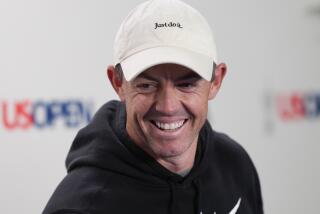There’s no quick fix for Tiger Woods’ game
- Share via
From Paramus, N.J. — The once hands-down greatest golfer in the world, the impenetrable and unshakable Tiger Woods, is now a process guy.
The man who beat the best of the rest on one leg in the 2008 U.S. Open at Torrey Pines, who never worried about winning because he always knew he would, is now a work in progress.
Listening to him back then, during 14 major victories and so much dominance of the pro tour that the other guys took heat for looking wimpy in his presence, he talked about what he had done and what he would do next. There were no ifs, maybes, or pretty-soons. Tomorrow was a given. When you dominated as he did, there was nothing to fear, and nothing to fix.
Saturday, in the third round of the Barclays at Ridgewood Country Club, he shot another mediocre round, a one-over-par 72 that left him nine shots behind leader Martin Laird. Afterward, he said things such as:
--”I’m very excited about what I’m doing, how I’m hitting the golf ball.”
--”...[I like] the crispness coming off and how many shots I hit the last three rounds pin high…”
--”I just continue down the road. It’s a process. Any time I’ve made a change in my golf swing, it’s a process. And I’m very pleased with what’s been going on.”
-- “As we all know, I can move my hips pretty good, but they’re moving at the wrong time. It’s just a matter of synching that all up.”
The obvious question is how it got un-synched. The obvious answer, understandably something Woods doesn’t want to address, is that everything came unhinged in his own driveway that Thanksgiving weekend last year, and has continued to unravel. If anyone ever questions the importance of the brain to a golf swing, Woods’ current torment is the clearest answer.
Earlier last week, his divorce was finalized. He addressed that in a news conference before the tournament, handling again, as best he could, questions about love and infidelity that have never stopped being asked since he simultaneously crashed his car and his personal life.
Then he went out and shot a tournament-leading 65 on the first day, and the golf world sat up — again — and speculated that Tiger was back. Maybe the divorce would bring closure. Maybe this was the first sign. Maybe, maybe, maybe.
He answered with 73 on Friday and 72 Saturday.
Any hope of this being the big comeback story that everybody seems in such a hurry to have happen disappeared with his first swing. He hit a three-wood that duck-hooked out of bounds and led to a triple-bogey seven. He had started at four under, suddenly lost most of that, and spent the rest of the day battling back to within one shot of where he had been.
He called his tee shot on No. 1 “an awful swing.” And added, “I got caught between my old swing and my new swing.”
But he also said, “I’m pleased how I sucked it up and got it back the rest of the day, when it easily could have gone the other way.”
He was once a perfectly humming engine. He knew when to change the oil and replace the belts. He had coaches, but he won mostly because he was Tiger Woods and he knew what to do and how to play. Now, he is a carburetor, allowing himself to be tinkered with. He has a new coach named Sean Foley. He says he is working with him, but there has been no long-term commitment.
Asked about that, Woods said, “It’s a process.”
The more honest answer, one we wouldn’t expect from him or anybody in his spot, is that all this technical swing talk, this prattle about process and gradual improvement and slowly getting back to where he was, is his happy place. It is a cocoon that deflects from the reality of a game that is a mess because he screwed up his life and made every venture onto a golf course a pressure cooker.
That’s human, understandable and probably even mentally healthy.
But it should be seen for what it is, so we can start lowering our expectations of Tiger being Tiger any time soon, or of golf’s planets getting back in line.
Right now, he has to play a decent round Sunday just to qualify for the second step of the four-tournament FedEx Cup playoffs next week in Boston. Qualifying for tournaments, worrying about staying in the top 100 in FedEx points, was never a consideration for the old Tiger. Now, it’s a baby step he needs to take.
He would call that part of the process.
bill.dwyre@latimes.com
More to Read
Go beyond the scoreboard
Get the latest on L.A.'s teams in the daily Sports Report newsletter.
You may occasionally receive promotional content from the Los Angeles Times.











